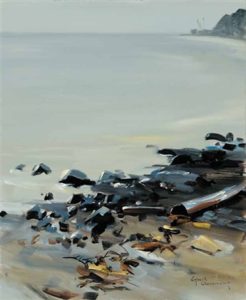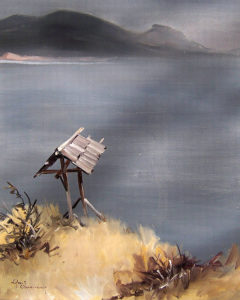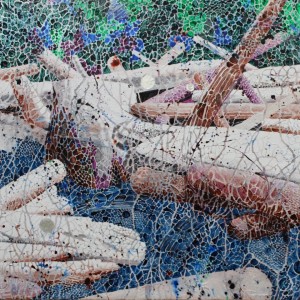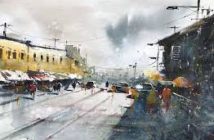Dear Artist,
My late friend Egbert Oudendag used to say, “The best way to help artists is to hinder them.” He had the idea that being tough was the way to bring out their gumption. It was also the key to finding voice, style, and the ego-force to get noticed. “You need to struggle on your own,” he used to say. “No one can help you.”
In many ways I’ve agreed with him. But over the years I’ve also flirted with the idea that the only input an artist really needs is approval. That concept has its disadvantages too. When you are asked and when in your opinion someone’s work is truly lousy, it’s dishonest to sit there and say, “Wow, go for it.” For those who might offer help to others, here are a few ideas that sometimes produce results:
Think empathetically about where the artist is coming from and try to identify no more than three needs. Predicate your input with the caveat, “It’s only an opinion.” Sandwich these needs, as you see them, between two genuine compliments, no matter how minor. Don’t be afraid to be straight up and honest. In some ways Egbert had the “tough love” idea right — if they can’t take it, they’re not on a growth path and need to be abandoned anyway. If possible, give specific suggestions — take this course, go to this school, join this group, go to your room, phone the Guggenheim. Better still, phone the Guggenheim for them. Offering up-and-coming artists a simple connection with a public, commercial or educational venue is one of the best things a helper can do. Then the rejection or acceptance is in someone else’s hands, and they begin to get a feel for the sweet-and-sour nature of the real world.
Having said that, many artists need to drop, at least for the time being, notions of commercial or fame-oriented exposure. Premature articulation is a main cause of disappointment. Artists often need to be gently told to get a daily life inside their own processes. They need to know that in the long run there is no silver bullet — no school, no club, no gallery. Robert Henri, one of the greatest helpers of all time, used to repeat to his students, “All education is self-education.” We owe it to everyone, including those who might eventually support us, the thought that there’s nothing more sacred and beautiful than the private business of trying to get good on our own terms.
Best regards,
Robert
PS: “Every artist ought to be an exhibitionist.” (Egbert Oudendag)
Esoterica: Just as the doctor says, “Take this and call me in the morning,” the artist-to-artist exchange can be similar: “Paint a hundred paintings and tell me when you’re done.” Some folks move right on to pharmacy or accounting and are never seen again. But those who respond to this rigorous request are generally the serious ones. They intuitively know that the need to work in series and toward set goals is the main game. The wise learn to set goals for themselves. There’s no other word for it but “character.” In a demanding world where many are fighting for survival, the real goal is “thrival.”
This letter was originally published as “How to help other artists” on November 7, 2006.
Have you considered a Premium Artist Listing? With each letter, an artist is featured at the bottom of this page. The Premium Artist Listings are a means of connecting artist subscribers through their work. Proceeds from each listing contribute to the production of The Painter’s Keys.
“Do not make the mistake of asking me my particularities.” (Egbert Oudendag)
Featured Artist
We live in a fractured world. Wars, famine and power games are forcing people to abandon their homes and their way of life in hopes of finding peace. For lack of education or specialized skills, the poor are not accepted into our northern communities. They stay in the camps on the borders of turmoil, separated from local community. Animals are caught in the crossfire. Even the trees and the rocks suffer the agony of imbalance. This chaos is evident in my work. In between the rivulets of paint and the textural accidents I choose colours and forms to suggest a landscape where beauty continues to reign. We can still change the tide and build a new world harmony. Certainly, contemporary will focuses on gold instead of beauty. Yet, beauty is essential to the wellbeing of the planet. She is essential to the survival of humanity.








15 Comments
I just started receiving these letters about a month ago. Feel nervous about commenting, because I am not a career artist. I haven’t sold a painting in at least 2 years.
I used to think that if someone wanted to buy my painting, it was “good” or “good enough.” What has happened for me with my serious/continuous painting is personal growth. I have reached a place where if I am satisfied with my work, it really doesn’t matter what others think of it. I paint mainly because I enjoy it while I am doing it and also because there is a niggling feeling I get if I haven’t done anything creative in a while.
But about helping: for myself, I got a lot from critiques when I took painting classes. When I share my work with artist friends now, it does not help me if they just say they like it. What do they like and what would make it better? I always have the choice of making changes or not.
I agree with you Cathy. I don’t bring my paintings to a critique looking for praise. As a group of artists we can support and encourage each other in our groups but most of us are looking for good ideas about how we might grow in our medium.
I’m a largely self-taught watercolorist who has been teaching beginner watercolor for 15 years. Early on, I decided never to lie to my students about the quality of their paintings. But it was surprisingly easy to be both honest with constructive criticism, AND encouraging no matter what their level.
Most people know exactly how bad they are; what they need is suggestions about how to do it better. More important is to point out their strengths, and encourage them to do more of what they do well. That positive reinforcement, I’ve found, works a hundred times better than anything else.
I was unfortunate to have one of the world’s worst teachers in the first watercolor class I took in NYC, and thanks to his casual insults and lack of help, I literally came within a hair of quitting wc forever. If it hadn’t been for encouragement by the students sitting next to me, I would never have stuck to it, and later establish a whole second career as an artist. As a trained psychologist, I assure you that nothing works better than positive reinforcement.
http://www.joaniaconetti.com http://www.watercolor.joanweb.com
I love critique day at my art group. First we talk about our painting, discussing what we like and what challenges we have with it. Then the chosen “critiquer ” of the day gives their opinion, then the members give their opinion. This way we can look at our work with fresh eyes and because we take turns critiquing, we learn to look at art with our heads. I have learned so much with this process.
This critique sounds exactly like the one we do in the Idaho Watercolor Society. The help is really good and the friendship is life-giving. One thing though that happens now-and-then, a painting is set up and there is a long moment of silence from the group. Then maybe a voice full of admiration says, “Frame it.” Once in a while a painting shows up that wonderful and finished. There is even something to learn at those times too.
As we all know and are aware, art is totally subjective. This is definitely not a new revelation. It’s been said a million times over. Critiquing other’s work, for me, is difficult I believe because even if we sandwich a positive between two negatives as Robert suggests in this article, we somehow, nevertheless, run the risk of overstepping our point of view. People have feelings and they must be taken into consideration, which can be a touchy thing. Most members of critique groups, that I’ve attended, seem always to be on guard and somewhat hesitant to make any remarks. This can and maybe does cause a certain hesitation to open one’s mouth about another artist’s work. Because, let’s face it, who is really in a place to judge or point out to someone else what they should do with a piece of their art unless of course if one has gained widespread recognition in the art world. And besides, so many of us are at different and various stages of our journey toward creating. Hearing from others with their viewpoint is a good thing. There are always things we can learn from others if they are honest and we then have the ability to make changes or not.
Great article! Regarding “Helping other artists” through critique, I’ve found as an instructor that asking a question can’t hurt. Instead of “That green is just wrong!”, asking “What if the green next to your focal point was neutralized, so that your focal point would be even more evident?” Starting a recommendation with “What about…”, “What if…,” “What were your intentions in beginning the piece?” might be a way to introduce an idea without causing resentment. It’s the Socratic method of teaching, to find answers through questions. In a critique, everyone’s viewpoint can be respected.
“What if…..?”; “Tell me about…..”; I really like your use of…..”; “How did it feel when you….?”; “What do you think about…..?” Being a ‘highly sensitive person’, this respectful, supportive approach would encourage and inspire me to be self-critical and strive to continue to improve. The ‘tough love’ approach tends to imobolize me and triggers shame and discouragement. Thanks Rick.
Thank you for this response, Jan. These are questions to ask oneself.
I believe that a critique should only be given if asked for. Encouragement may be all that the artist needs when showing the work. But of course the Socratic method is always the best course. Nuts to tough love.
Love this newsletter BUT I never get it. I am subscribed but it never arrives. Yes I have checked my spam folder. Would you Delete my subscription so I can try to resubscribe again?
Hi Marsha,
Please email me at sara@saraphina.com and I will resubscribe you.
In friendship,
Sara
Just yesterday I was discouraged with my 6th iteration of a portrait I’m attempting to do. I’ve done them in one sitting before and was about to allow discouragement to creep in when I remembered some article that suggested painting a teacup 100 times before quitting. And here is the 100 times idea coincidentally today as I read this! I’m encouraged anew — and about to go start in for 94 more times if needed. Thanks for sharing more of your dad’s wisdom, Sara.
There’s a critique and then a critique. Critiquing someone else’s work is actually an art within itself. I’ve had great, in-depth suggestions and at other times weak, demeaning “comments.” These two styles of critique are both miles apart. The good in-depth suggestion style can truly enhance an artist’s work in which you can pull out new ideas for a stringer piece. The demeaning, weak, generalized comments do nothing for an artist and sometimes have nothing to do at all with the artist’s work but the artist him or her self. I’ve learned over the years, to really look at who is giving the critique, their knowledge, expertise and experience. When I’m being critiqued I actually interview them. Then I decide if they are going to get the job or not. I always look for the master of critiques because their knowledge can be priceless. Remember it’s to make ones work stronger and it’s never destructive or personal from a master….it’s enriching.
There’s a critique and then a critique. Critiquing someone else’s work is actually an art within itself. I’ve had great, in-depth suggestions and at other times weak, demeaning “comments.” These two styles of critique are both miles apart. The good in-depth suggestion style can truly enhance an artist’s work in which you can pull out new ideas for a stronger piece. The demeaning, weak, generalized comments do nothing for an artist and sometimes have nothing to do at all with the artist’s work but the artist him or her self. I’ve learned over the years, to really look at who is giving the critique, their knowledge, expertise and experience. When I’m being critiqued I actually interview them. Then I decide if they are going to get the job or not. I always look for the master of critiques because their knowledge can be priceless. Remember it’s to make ones work stronger and it’s never destructive or personal from a master….it’s enriching.